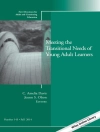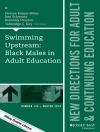This book presents a collection of papers from RMIT’s annual learning and teaching conference, Transformations in Tertiary Education: The Scholarship of Engagement at RMIT. It discusses innovative curricula and assessments, examines transformative student experiences and showcases examples of curricular and extra-curricular activities to promote and develop intercultural awareness and competence.
The book showcases high-quality, innovative papers on promising new directions in tertiary education, representing the breadth and depth of teaching and learning at a leading global Australian university. Authors from Australian and offshore campuses address compelling questions related to curricula, technology, and assessment. Further, they employ a variety of methodological approaches to illustrate 21st century global perspectives on learning and teaching.
Readers will be introduced to the complex interrelationships between scholarship and practice, innovative learning design and learning outcomes, and the shifting scholarship roles of the university, the teacher and the learner.
Inhoudsopgave
Section 1 Engaging for Belonging.- 1 Belonging: Overview.- 2 Partnerships for learning and belonging in tertiary education: A social capital analysis.- 3 Nurturing the resilient graduate: The role of the university and learner.- 4 Belonging in learning and teaching: Enhancing diversity and inclusion through students’ transformative experiences in prison.- 5 Emebedding academic literacies for belonging in First Year Criminology.- 6 Youth ready for youth futures: A case study of project-based learning in youth work.- Section 2 Engaging for a Global Outlook.- 7 Global Outlook: Overview.- 8 Teaching strategies for transnational education.- 9 Reflective writing as a learning tool: Assisting undergraduate business students from diverse backgrounds to participate in a globalised marketplace.- 10 Preparing future global management accountants through COIL: Evaluation of outcomes.- 11 Engaging students in a multi-cultural class at RMIT Vietnam.- 12 Cultural intelligence evening: An extracurricular initiative to prepare second year students for a global workforce.- Section 3 Engaging for Life and Work.- 13 Life and Work: Overview.- 14 Tracking graduate preparedness through a national capstone assessment.- 15 State library of Victoria: A giant canvas for RMIT students.- 16 A research-led approach to authentic assessment design for an introductory Accounting course.- 17 Experiential learning, entrepreneurship, enterprise: Designing learning for the future of work.- Section 4 Conclusion.- 18 A vision for future scholarship and engagement.
Over de auteur
Professor Belinda Tynan is the Deputy Vice Chancellor (Education) at RMIT University, where she is responsible for the quality and overall design of academic programs, student administration and services, academic performance (including promotion); updating of teaching pedagogy, delivery mechanisms and learning resources; and student access and equity. Her research interest is chiefly in the field of online and digital education with a keen focus on ‘openness’, staff workload and more recently learning analytics.
Tricia Mc Laughlin is a nationally recognized scholar in the area of lifelong learning and pathways. She has extensive experience in the development of lifelong learning principles and their application in workplaces, educational settings and schools. The primary focus of her work is on learning and teaching models; and the evaluation of impact, particularly in STEM teaching.
Professor Andrea Chester is currently Dean of the School of Education at RMIT University. An accomplished senior academic and executive with 20+ years’ experience in tertiary education, Andrea has led learning and teaching innovation at local and national levels. She has particular expertise in the development of partnerships to enhance learning, with experience in co-design and mentoring models. Andrea is a member of the Australian Council of Deans of Education and has been recognized nationally for her teaching excellence.
Dr Cathy Hall-van den Elsen has extensive experience in tertiary learning and teaching.
The primary focus of her work has been on developing models and professional development for transnational learning and teaching, and addressing the challenges and opportunities for academic and teaching staff moving from traditional classrooms to ‘new generation’ learning spaces. Cathy’s most recent project was the leadership of RMIT University’s 2018 learning and teaching conference, Transformations in Tertiary Education.
Dr Belinda Kennedy is an academic at the School of Education and the College of Science, Engineering and Health at RMIT University. Belinda has broad experience in STEM disciplines, in particular science, and has initiated a number of STEM learning approaches for on-campus and off-campus programs for students at all year levels.












